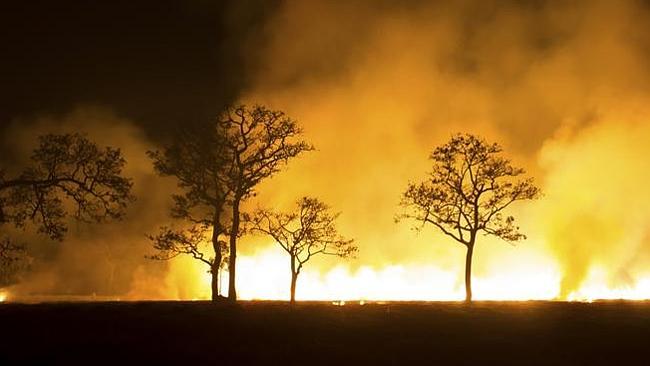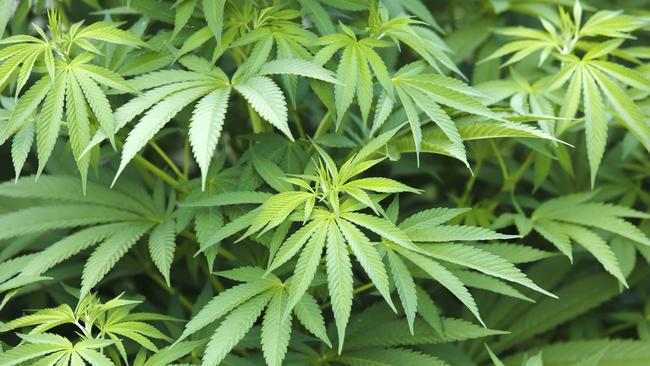Queensland crime: Murders of William Paul Clarke and wife Grayvyda still unsolved
THEY were a well-liked couple enjoying semiretired life on a Queensland property. But when they were found burnt to death in their home, the shocking truth about the pair was revealed.

News
Don't miss out on the headlines from News. Followed categories will be added to My News.
BUSINESS was blooming for William Paul Clarke in 1981.
A talented dope-grower, his services were in high demand, despite the aggressive war on drugs waged by the Bjelke-Petersen Government and the Queensland Police Force.
From his 93ha property in far north Queensland, Clarke was a key producer for a thriving cannabis operation that spanned the east coast, enjoying a handshake deal reportedly worth $30,000.
Who he was contracted to was unknown, but when he and his Latvian-born wife Grayvyda were murdered execution-style, fingers were pointed at a Black Hand-style Calabrian crime gang.
On May 25, 1981, their bodies were found in their incinerated A-frame house on Pinnacle Rd at Julatten, a sprawling rural community in the ranges west of Port Douglas.
Neighbour Russell McDiarmid, who had socialised with the couple the previous night, made the grisly discovery.
“We went for the fire brigade and police and came back to discover the remains under the iron of a burnt-out bed,” he said at the time.
“They were unrecognisable. All that remained was part of their ribcage and pelvic bone. Their limbs and heads had been burnt away.”
Both had been shot with a 12-gauge shotgun as they lay in bed, an autopsy revealed, and police believed whoever had killed them had burnt down their house, leaving little more than twisted sheets of corrugated iron, charred stumps and a concrete slab, to hide their wounds.
The blaze was so intense it melted coins, utensils and bottles in the kitchen.
Friends said the couple had shown no signs of feeling threatened before their deaths.
A day earlier, they drove their vintage 1930 Morris truck to nearby Mt Molloy for a horseshow.
They later watched a movie at The National Hotel, the town’s only pub, before heading home about 11.30pm.
Early the next morning, a neighbour claimed to have heard a motorcycle heading in the direction of the Clarkes’ house but the rider was never found.
Detectives had little doubt the double murder was drug-related; North Queensland was, after all, the country’s marijuana mecca, and the illegal trade was bustling and highly competitive.
The Clarkes were known pot-growers but their friends were shocked at the thought they had such violent enemies.
“I’ve never seen Paul or ‘Vyda involved in any drug transactions,” said Jeff Baldry, publican of The National Hotel.
“They were well-known and well-liked. No one had a grudge against them.”
Mr McDiarmid said the Clarkes were generous with their money and often hired locals to do work on their property.
“He enjoyed a quiet life and was semiretired,” he said.
“Whoever killed them must have been really dirty on Paul because they killed ‘Vyda too and she was a quiet girl who never took a drink.”
Friends said the Clarkes had no obvious source of income yet they always seemed to be cashed up.
They had plenty of money to buy trucks and machinery for their property and boasted more than 12 vintage cars.
They produced two cheques — worth $20,000 in total — to pay for their Julatten property.
The link between drugs and murder was quickly established.
Police said Clarke had been growing crops in remote bushland on Cape York and sending his harvest to larger southern markets.
Authorities also named him as a leader of a syndicate of “hippies” producing large quantities of marijuana in remote scrub at Idlewilde Station, near Lockhart River, in the early 1970s, selling leaf in 10kg bundles to buyers as far south as the Gold Coast.
The dope was allegedly compressed and packed into steel drums before being transported south on trawlers.

In the late ‘70s, Clarke moved to Julatten to cash in on a market dominated by Italians, working a crop near Mareeba, a town considered at the time to be the state’s cannabis capital.
He expanded his venture by importing Buddha sticks and heroin to sell, ignoring warnings from associates about “mixing with the wrong people”, specifically a Calabrian group reminiscent of the powerful Black Hand Society that menaced cane farming communities in Queensland and New South Wales decades earlier.
The group, which originated from Griffith, wanted the lion’s share of the state’s drug market.
The investigation into the Clarkes’ deaths was all but dormant for more than four years — attracting no end of criticism for leads that were not followed and innuendo about the role of police in the region’s drug activities — before Terry Sichter, a crop-sitter previously employed by Clarke, was charged with two counts of murder.
He was acquitted of the charges at a 10-day trial, where it was revealed he was in Gatton — 2000km from the Clarkes’ property — when the executions were carried out.
Sichter insisted police had tried to set him up after he refused to give evidence against another accused drug grower.
He sought compensation for wrongful arrest and imprisonment, but in 1989 he was found dead from a bullet wound to his head at a prospecting camp near Idlewilde Station.
Police said his death was not suspicious.
An Australian Bureau of Criminal Intelligence briefing to Queensland Cabinet in 1984 suggested the Clarkes were most likely killed by one of two Melbourne-based Calabrians who arranged drug payments and transport.
Rocco Francesco Medici, 47, and his brother-in-law Guiseppe Loui Furina, 41, were known to have operated in North Queensland and had worked with Clarke and his associates.
The pair’s chain-bound bodies were found in the Murrumbidgee River, in New South Wales, in 1984.
An inquest into the Clarkes’ murders has never been held and the investigation remains open. In 2008, the case was added to the State Government’s list of unsolved crimes that attract rewards of up to $250,000.


